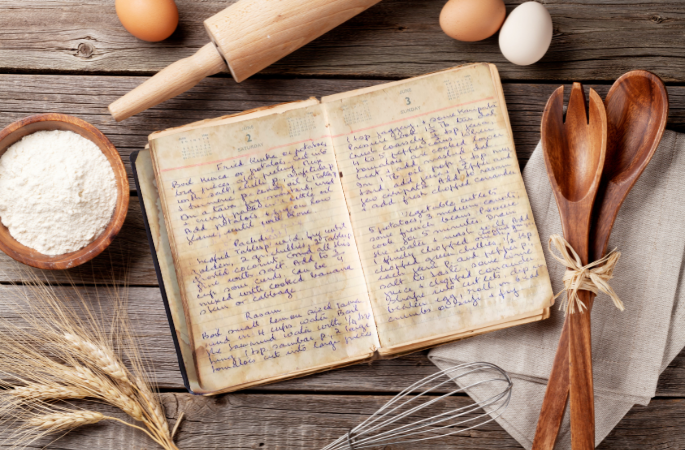This is an edited version of a piece I wrote over three years ago, when we, as an extended family, decided to remember my mother’s 100th birth anniversary by bringing out a book of her recipes. I volunteered to put it together, collating recipes and memories of our mother’s cooking from my immediate family, my siblings, and their children. Food is so intimately connected to relationships, to identities and to our memories. This piece, for me is an attempt to remember my mother through food and the bonds of love and caring it creates.
A tattered old diary accompanies me everywhere. For me, it is filled with the unsentimental, practical, matter-of-fact love that Mummy showered on all of us. I was never a “feminine” type of person. As and as I grew into adolescence, my proto-feminist leanings made me reject the knowledge of all things feminine, including sewing and cooking. So, when I had to manage a kitchen for the first time in my late 20s, I desperately turned to Mummy for help. I fondly remember her inducting me into the ways of cooking (unfortunately I never learnt sewing) and this recipe book that she compiled for me in 1984 was a precious guide in those days. Now, many of them, or at least the ones I use regularly, are imprinted in my memory, a loving gift from my wise and lovely mother.
Somehow, I never considered Mummy as the “domestic” kind of woman. She was always reading, teaching, using her intellect and spending time with others. Yet quietly and with no fuss, she managed a household in addition to holding a job and looking after her large brood. Of course, here I must acknowledge the loving care of so many other “mothers”, especially Idu, who cared for all of us from the time my eldest sister was born until after my youngest sister’s birth.
Mummy’s cooking, like her presence, was simple, no-nonsense and wholesome. She made no big deal of it, even with the constant stream of guests (many of them unexpected and last minute) that shared our table. I remember a secret code that we had, in the family, to cope with the occasional shortage of food when there were sudden guests: MIK meant more in kitchen and FHB was family hold back!
Looking back over the years, I feel a deep sense of gratitude, affection and love. Love is what binds our family together and we have experienced it in full measure from our beloved parents. Love is connected, among other things, with food, with cooking, caring, nurturing, and teaching, all of which Mummy did over the years.
So many of my memories of the past and of her are connected with food. As a little girl in Jammu, I remember long hours spent by those older than me taking turns to churn the ice cream pail, until the delicious ice cream concocted by Mummy would emerge, creamy and delicious. Before Christmas, there would be a flurry of sweet making: rolling kulkuls on the backs of forks, taking out the dry fruit that had been soaked in brandy in October to put into the Christmas cakes that would be baked, with inviting smells filling the house. And my favourite was milk toffee. I remember, as kids, how we would all jostle to get our chance at licking up the remains in the mixing bowl! My favourite breakfast meal was fried egg with atoilolem umon: leftover coconut curry that had been thickened by drying it on a slow fire. Mummy would try her hand at anything. Once, when we were in Delhi in the early 1970s, she tried to make jamun wine, inspired by the abundance of jamuns on the trees near where we lived. When we checked on it after some days, the eagerly awaited jamun wine had turned into a great vinegar! Cut to my college days in Sophia College, Bombay, when, bored of the repetitive hostel cuisine, I would eagerly await food parcels sent by Mummy from Delhi through family or friends. Everyone’s hot favourite was Mummy’s meat pickle (made in green masala). As soon as it arrived, all my friends would be ready with their slices of bread, and within no time, the pickle would be polished off.
Mummy was open and eclectic in her tastes for food, and she picked up recipes from friends everywhere. We enjoyed everything from the Burmese Kao Sweh to Goan prawn curry, from North Indian chole-puri to South Indian lemon rice (which used to be called Masterji’s lemon rice, as I believe the recipe had come from a Bharat Natyam dance teacher of Sunita and Priti, probably from the Jammu days in the early 1960s). In her later years, our kitchen became increasingly vegetarian and South Indian, as she learnt a lot of cooking from our beloved sister Priti, who was the doyen of cooks and a perfectionist in the kitchen (and elsewhere).
Times have changed since Mummy handed down her recipes to me 39 years ago. Today, many of us go to food blogs or YouTube for recipes. Some of the ingredients in these recipes, like ajino moto, margarine and sugar, are no longer considered healthy (we can drop them or find healthier substitutes if we want to). Yet the charm of that tattered old recipe book, stained from many encounters with butter and curries, replete with memories, still remains. And hopefully, these recipes will go down the generations, to those who were born after Mummy’s times, and be a source of delight and inspiration to them. Actually, I find reading recipes almost as enjoyable as following them. And as I compile these recipes, Mummy comes alive for me once again; I relive the tastes and smells of my childhood, and I experience the loving care and unconditional acceptance that she and Daddy showered on all of us, which helped each one of us children explore the world without fear and find our place in it.
This compilation of recipes, collected from all of us who learnt to cook from her (in addition to much else), is a tribute to a warm, courageous, affectionate, sometimes mercurial and short-tempered, always generous person, who has made me what I am today. I am filled with love and beautiful memories of her, the one and only Sofia.



